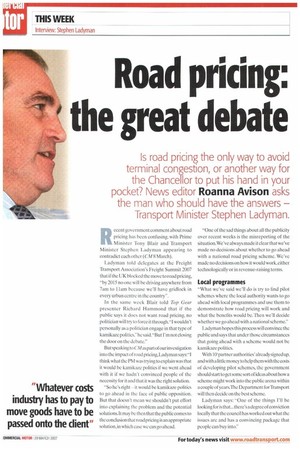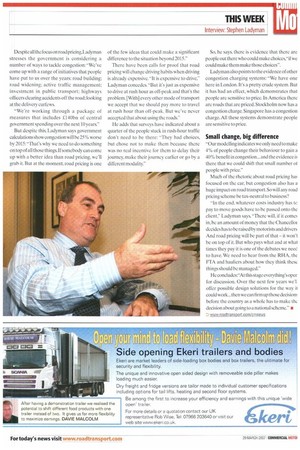Road pricing: the great debate
Page 20

Page 21

If you've noticed an error in this article please click here to report it so we can fix it.
Is road pricing the only way to avoid terminal congestion, or another way for the Chancellor to put his hand in your pocket? News editor Roanna Avison asks the man who should have the answers — Transport Minister Stephen Ladyman.
Recent government comment about road pricing has been confusing, with Prime Minister Tony Blair and Transport Minister Stephen Ladyman appearing to contradict each other (CM 8 March).
Ladyman told delegates at the Freight Transport Association's Freight Summit 2007 that if the UK blocked the move to road pricing, "by 2015 no one will be driving anywhere from 7am to 1 lam because we'll have gridlock in every urban centre in the country".
In the same week Blair told Top Gear presenter Richard Hammond that if the public says it does not want road pricing, no politician will try to force it through. "I wouldn't personally as a politician engage in that type of kamikaze politics," he said."But I'm not closing the door on the debate."
But speak i ng to CM as part ofour investigation into the impact of road pricing, Ladyman says:"I think what the PM was trying to explain was that it would be kamikaze politics if we went ahead with it if we hadn't convinced people of the necessity for it and that it was the right solution.
"So he's right — it would be kamikaze politics to go ahead in the face of public opposition. But that doesn't mean we shouldn't put effort into explaining the problem and the potential solutions. It may be then that the public comes to the conclusion that road pricing is an appropriate solution, in which case we can go ahead. "One of the sad things about all the publicity over recent weeks is the misreporting of the situation.We've always made it clear that we've made no decisions about whether to go ahead with a national road pricing scheme. We've made no decisions on how it would work, either technologically or in revenue-raising terms.
Local programmes "What we've said we'll do is try to find pilot schemes where the local authority wants to go ahead with local programmes and use them to demonstrate how road pricing will work and what the benefits would be. Then we'll decide whether we go ahead with a national scheme."
Ladyman hopes this processwill convince the public and says that under those circumstances that going ahead with a scheme would not be kamikaze politics.
With I 0`partner authorities' already sigied up, and with a little money to help them with the costs of developing pilot schemes, the government should start to get some sort of ideas about how a scheme might work into the public arena within a couple of years,The Department for Transport will then decide on the best scheme.
Ladyman says: One of the things I'll be looking for is that...there's a degree of conviction locally that the council has worked out what the issues are and has a convincing package that people can buy into. Despite all the focus on road pricing,Ladyman stresses the government is considering a number of ways to tackle congestion: "We've come up with a range of initiatives that people have put to us over the years: road building; road widening: active traffic management; investment in public transport: highways officers clearing accidents off the road; looking at the delivery curfews.
"We're working through a package of measures that includes 40bn of central government spending over the next 10 years."
But despite this. Ladyman says government calculations show congestion will be 25% worse by 2015: "That's why we need to do something on top of all those things. If somebody can come up with a better idea than road pricing, we'll grab it. But at the moment, road pricing is one of the few ideas that could make a significant difference to the situation beyond 2015."
There have been calls for proof that road pricing will change driving habits when driving is already expensive. "It is expensive to drive," Ladyman concedes. "But it's just as expensive to drive at rush hour as off-peak and that's the problem. [With] every other mode of transport we accept that we should pay more to travel at rush hour than off-peak. But we've never accepted that about using the roads," He adds that surveys have indicated about a quarter of the people stuck in rush-hour traffic don't need to be there: "They had choices, but chose not to make them because there was no real incentive for them to delay their journey, make their journey earlier or go by a different modality." So, he says, there is evidence that there are people out there who could make choices,-if we could make them make those choices".
Ladyman also points to the evidence of other congestion charging systems: "We have one here in London. it's a pretty crude system. But it has had an effect, which demonstrates that people are sensitive to price, In America there are roads that are priced. Stockholm now has a congestion charge. Singapore has a congestion charge. All these systems demonstrate people are sensitive to price.
Small change, big difference "Our modelling indicates we only need to make 4% of people change their behaviour to gain a 40% benefit in congestion... and the evidence is there that we could shift that small number of people with price."
Much of the rhetoric about road pricing has focused on the car, but congestion also has a huge impact on road transport.So will any road pricing scheme be tax-neutral to business?
"In the end, whatever costs industry has to pay to move goods have to he passed onto the client," Ladyman says. "There will, if it come!, in, be an amount of money that the Chancellor decides has to be raised by motorists and drivers And road pricing will be part of that it won'l be on top of it. But who pays what and at whal times they pay it is one of the debates we neee to have. We need to hear from the RHA, the FTA and hauliers about how they think these things should be managed."
He concludes:"At this stage everything's °per for discussion. Over the next few years wel offer possible design solutions for the way ii could work...then we can firm up those decisioro before the country as a whole has to make the decision about going to a national scheme." •
www.roadtranspo rt.co micrn news
























































































































































































